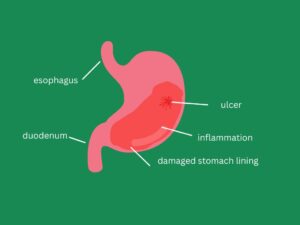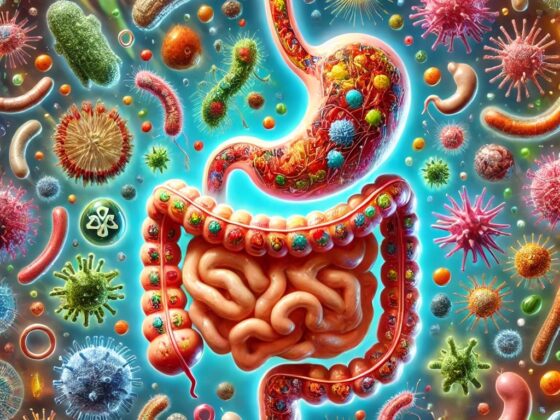Gastritis encompasses a wide range of conditions characterized by the inflammation of the stomach lining. Normally, this lining produces mucus that protects our stomachs from the stomach acid and digestive enzymes. In case of gastritis it fails to complete its function. As a prevalent digestive issue, which affects millions worldwide, underscoring the importance of awareness and timely medical intervention.
At ALLIANCE™ Laboratories, we harness advanced diagnostic techniques to pinpoint the specific causes of gastritis. This enables targeted treatments that enhance patient outcomes. Our commitment to precision places us at the forefront of gastroenterological care. Both patients and healthcare providers receive reliable and actionable health insights. Read this article to find out more about what gastritis is, its causes, and how our specialized diagnostic services play a pivotal role in the effective management of this condition.
What is Gastritis?
Gastritis is an inflammation of the stomach lining that can occur suddenly (acute gastritis) or gradually (chronic gastritis). Its symptoms range from mild indigestion and nausea to severe abdominal pain and vomiting. Chronic gastritis usually slowly develops over time and often remains undetected until symptoms become pronounced. This inflammation can lead to erosion of the stomach lining, causing ulcers and increasing the risk of stomach cancer.
Causes of Gastritis:
The causes of gastritis vary, ranging from infections to lifestyle factors. The most common cause is infection with Helicobacter pylori (H. pylori), a bacterium that colonizes the stomach mucosa. Other significant contributors include long-term use of nonsteroidal anti-inflammatory drugs (NSAIDs) and excessive alcohol consumption, both of which can weaken the stomach’s protective lining and increase acidity, leading to inflammation. Accidental ingestion of bleach and other toxic chemicals (eg: Wisteria plant) can also cause ulcers. Additionally, stress, autoimmune disorders where the body attacks its own stomach lining, and bile reflux disease can also be a cause. Less frequently, it can result from other medical conditions, including viral infections, especially in people with weakened immune systems. Identifying the precise cause is essential, as it directs the treatment strategy and involves a detailed diagnostic process, which can vary significantly from one patient to another.
Diagnosis of gastritis:
At ALLIANCE™, we perform the histological exam, which involves taking a biopsy sample of the stomach’s tissue that has been fixed in the formalin solution and staining it with different dyes to identify specific patterns of inflammation, cellular damage, or abnormal growth that are indicative of various types of gastritis.
We employ a specialized Immunohistochemistry (IHC) staining technique that is particularly useful in detecting H. pylori. This technique uses antibodies that specifically bind to antigens produced by H. pylori, which are then visualized using a dye or a marker, providing clear evidence of infection.
We present the results of our examination in a detailed full-color report.
Treatment
Treatment for gastritis depends largely on the underlying cause, but generally aims to reduce stomach acid and heal the stomach lining. For gastritis associated with H. pylori infection, a combination of antibiotics to eradicate the bacteria and proton pump inhibitors (PPIs) to reduce acid production is commonly prescribed. In cases where NSAIDs are the culprits, discontinuing their use along with PPI therapy can significantly alleviate symptoms. For alcohol-related gastritis, abstaining from alcohol and possibly receiving PPI or H2 antagonist treatments can provide relief. Additionally, antacids neutralize stomach acid and reduce immediate discomfort. Dietary modifications, such as avoiding spicy and acidic foods, can also help manage symptoms. In all cases, ongoing monitoring by healthcare providers ensures that we can base the treatments on patient response and laboratory results.
Prevention Tips
Preventing gastritis starts with lifestyle choices. Reducing the intake of irritants such as alcohol, spicy foods, and NSAIDs can prevent the onset of its symptoms. Maintaining a balanced diet and managing stress through relaxation techniques or therapy can also help. For those at risk of H. pylori infection, good hygiene practices such as washing hands thoroughly and drinking clean water are essential. Regular check-ups and discussing any digestive discomfort with a healthcare provider early can lead to timely interventions, preventing complications associated with gastritis.
Conclusion
Understanding and managing gastritis effectively requires a clear grasp of its symptoms, causes, and treatment options. At ALLIANCE™, our state-of-the-art laboratory equipment plays a crucial role in accurately diagnosing gastritis. We enable personalized treatment plans that lead to better patient outcomes. By adopting preventative measures and seeking timely medical advice, individuals can significantly reduce their risk of developing gastritis. For healthcare providers, partnering with a specialized laboratory like ours ensures that diagnoses are precise and treatments are effectively tailored to each patient’s needs. Together, we can tackle the challenges of gastritis and enhance the quality of life for those affected.



